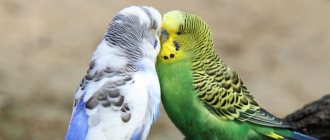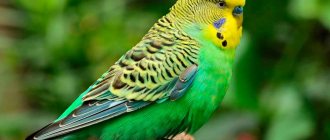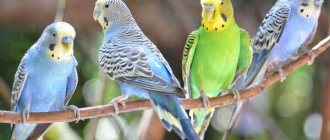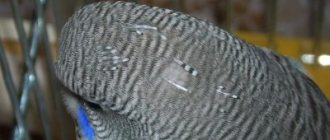A good owner knows a lot about his winged friend, but one can only guess why a parrot suddenly dies at home. When a person gets a tame parrot at home, he is preparing for a long life for his ward. There are several reasons for sudden death, which will be discussed in the article. You will learn what the signs of a dangerous condition are, whether your pet can be saved and what to do if it dies.
How to understand that a parrot is dying
Serious illnesses or injuries are visible to the naked eye. The first thing that catches your eye is a decrease in activity, poor appetite, and general weakness of the pet.
How else can you tell that a parrot is dying? There are a number of signs:
- severe vomiting began;
- the bird does not stand on its legs and falls all the time;
- paws are straightened;
- neck tense;
- the parrot is having convulsions;
- jumps up and falls again;
- paralysis occurs.
Symptoms that a parrot is dying take several hours to several days to appear. But most often everything happens very quickly. Small birds have an accelerated metabolism. Therefore, pathologies develop in an instant.
Signs of illness
That's why it's important to know what's normal for your budgie: what time he usually goes to bed, what his favorite treat is, how often he talks or sings, and more. A subtle change in a parrot's behavior is not normal as it could absolutely be a sign that something is wrong and this will help in time to realize that the parrot is dying
Parrots can get sick for a variety of reasons.
Here is a short list of some signs of disease in birds:
- decrease or increase in appetite;
- increased urination;
- increased water consumption;
- changes in feathers or skin;
- discharge from the eyes or nostrils;
- vomit;
- sneezing or wheezing;
- lameness;
- fluffy feathers;
- twitching of the tail while breathing;
- sudden changes in behavior, including biting or screaming;
- decreased activity level;
- voice change;
- change in ability to fly;
- spending more time at the bottom of the cage;
- weakness;
- swollen or discolored beak;
- change in droppings: color or consistency;
- voltage;
- diarrhea;
- weight loss or gain;
- blood on the bird or in the cage.
Any of these changes or other changes noticed in budgies should be brought to the attention of a veterinarian to determine if it is a sign of something more serious.
What to do if your parrot dies
If your parrot dies, you should see a veterinarian immediately. First aid will not be superfluous, it will alleviate the pet’s condition and help gain a few precious minutes.
So what can you do if your parrot dies? The action plan is:
- If traumatic shock or shortness of breath occurs, any corticosteroid, such as dexamethasone or prednisolone, must be administered intramuscularly.
- In case of fractures, the parrot should be immobilized so that in panic it does not injure itself further.
- Convulsions, chills - wrap the bird in a warm cloth.
- If your pet has inhaled toxic substances, paint, or gas, it is recommended to take it out into fresh air. At this time, thoroughly ventilate the room.
- If a parrot has swallowed a poisonous plant or spoiled food, you need to give it a sorbent several times throughout the day. That is, regular activated carbon or enterosgel.
- In case of vomiting or diarrhea, it is necessary to give 1 ml of glucose with saline every 10 minutes.
- If a chemical burn occurs, Solcoseryl eye gel will be useful. It needs to be inserted into the beak. Then apply to eyes and nostrils.
- In case of drug poisoning, it is worth giving the bird a sorbent first, and then, after a couple of hours, a laxative.
How to treat a cell
If a parrot dies unexpectedly, it is recommended to find out the cause of death
This is especially important if there are other birds in the house. If there is a veterinary clinic and laboratory in the locality and they will do this, then this is an ideal option
Birds can suffer from contagious and dangerous diseases such as chlamydia, tuberculosis, and salmonellosis. Even if it was not possible to find out what caused the parrot’s death, the bird’s cage must be thoroughly disinfected.
You can treat the cage after the death of a parrot using the following means:
- Alkali;
- xylonaft 5%;
- creolin emulsion.
Before starting treatment, wear rubber gloves and protect your respiratory tract.
Disinfection is carried out if the pet suddenly died for unknown reasons or had parasites, bacterial and viral infections.
Why parrots die - causes of death
There are many reasons why parrots die. This includes the carelessness of the owner, illness, and injury. This also includes genetic and psychological factors.
Place of purchase
Spontaneous bird markets and dubious pet stores are not the best place to buy a parrot. Especially if a person does not know how to determine their age. An unscrupulous seller may sell an old bird. In appearance, it looks like a one-year-old individual. In this case, the cause of her death is old age.
In these same places they can sell a sick parrot. They may get sick due to inappropriate conditions or unbalanced food. This reduces immunity. The bird weakens before our eyes and then dies.
Injuries
The parrot receives them by flying out of the cage. It can crash into glass or a mirror, get burned, receive an electric shock, or become entangled in curtains. Owners and small children can also accidentally injure birds. They often become victims of attacks by other animals, such as cats or dogs.
Sometimes several parrots are kept in one apartment. In such situations, more active birds with leadership qualities offend weak, cowardly ones. They not only mutilate them, but also beat them to death.
The female dies if an egg gets stuck in her oviduct during laying.
Poisoning
Other options for why parrots die:
- Poisonous house plants, such as ficus, fern or milkweed.
- Polyurethane foam, glue.
- Household chemicals.
- Vapors from Teflon-coated products (iron, frying pan).
- Gas.
- Oil paints.
- Aerosols.
- Unnoticed fungi in bad feed.
The listed toxic substances lead to burns of the esophagus in birds, which subsequently leads to their death.
Emotional problems
Many do not take this factor into account, whereas it is psychological problems that open the door to other, more dangerous diseases. When a bird experiences constant stress, it significantly shortens its life.
Yearning
In stores, parrots are kept in groups and they never get bored. But when the pet is left alone, and the owner does not pay enough attention to it, the bird falls into apathy. As a result, the immune system is undermined, weakness appears, and the bird fades away literally before our eyes.
Buying a pet is a responsibility. He shouldn't be left alone for long. Rare visits during feeding are not enough to normalize the emotional state of the bird.
Fear and severe stress
When a parrot is constantly under severe stress, it begins to beat around the cage or, on the contrary, hides in a corner, plucking its feathers. A pet’s heart may not be able to withstand severe fright, so it should be protected from sharp sounds, for example, a washing machine, TV, or loud human screams.
What can a budgie die from?
There are many reasons why a wavy bird can die. In the first place is the negligence of the owners. The birds are modest in size. Therefore, flying freely around the room, they are able to fly out even through a barely open window.
In second place is poor nutrition. Parrots have a fast metabolism. Poisoning develops in a matter of minutes. And for this it is not necessary to inhale toxic fumes. It is enough to taste food from a person’s table. This applies to chips, sausages and sweets.
#1 15.01.2011 16:32:54
the parrot cannot fly and constantly falls from its perch
We adopted the parrot 2 months ago, now he is about 5 months old. he was cheerful, cocky, and flew freely. We fed him cokorite food/add calcium to the water. The cage is on the refrigerator. Previously, in a cage, he would sit on our finger, chirp, and let us pet him. 2 days ago, when we entered the kitchen, we found him on the shelf, he tried to get off the shelf, but fell on the table, they picked him up and he didn’t even snail, they put him in a cage. His wings are moving strangely, he’s shaking, he’s trying to climb onto the geode, but he can’t , hold on only with his beak, if we help him, he doesn’t sit there for long, and then falls again. a day later he seemed to feel better, they tried to let him out, but he flew up a little and crashed into the wall and fell. He also starts screaming and huddles in a corner when we approach him. Tell me what’s wrong with him, how to treat him, we’re very worried.
What to do if the parrot died
Due to confusion and depression, the owner of a dead bird may not immediately understand what to do with it. The pet needs to be buried. Then treat his cell.
How to bury
So, how to bury a parrot? This cannot be done within a populated area. Therefore, it is better to choose a place in the nearest forest or planting. Place the pet wrapped in cloth in a hole about 50 cm deep. Bury it. Sprinkle the top of the grave with branches or stones. This will help protect it from animals. If desired, the burial site can be marked with a flower or some other plant.
You can bury a parrot in a country house or in the courtyard of a private house. An area under a large tree is suitable for these purposes.
Nowadays, burial services for pets, including parrots, are increasingly being offered. They can be cremated.
Cell disinfection
This procedure will prevent the spread of the disease or infection that caused the parrot's death. Before it is carried out, it is strictly prohibited to place new inhabitants in the cage.
For disinfection, you need to prepare a solution of 1 tbsp. Ecocida-S and 1 liter of clean water. After putting on a respirator and rubber gloves, you need to thoroughly spray the cage with the resulting product. Leave for 30 minutes. Rinse with plenty of water and dry.
The treated cage should remain empty for at least another week. During this time, toxic substances will completely disappear from it.
Other factors
The lifespan of a budgerigar can be influenced by a number of other factors independent of the pet itself. First of all, these are genetics and the conditions of keeping the bird.
Place of purchase
Sellers at poultry markets are not always honest with buyers and may slip old birds. In addition, only a specialist can determine the exact age of a bird after a year. The same applies to hidden diseases, so it is better to buy a pet in trusted pet stores.
Genetics
Through the process of crossing, breeders try to produce remarkable individuals. But sometimes the results of their work manifest themselves in diseases inherent at the genetic level. It is very difficult to recognize such an individual. When buying a pet, experts recommend sticking to classic shapes and colors.
Bird living conditions
If the owner cleans the cage from time to time and uses mediocre products as food, then the bird will not last long in such conditions. She faces problems with the gastrointestinal tract, infections and parasites. All this shortens the life of the parrot.
Floor
It has been noticed that male birds at home live longer than females due to the double sex chromosome. While in the wild the opposite is true. Competition for mates and territory is a consequence of the death of many males.
How to cope with the death of a pet
There is no clear answer to how to survive the death of a parrot. Every time you remember him you will feel sad. And that's absolutely normal. For many, pets, even small ones, become family members.
Don't blame yourself for what happened. This will not bring the parrot back. Those who are faced with the same problem will help to survive the loss. You can find such people on forums on the Internet or among your own friends.
Knowing how a parrot dies will help you provide first aid to your pet if something suddenly happens. Perhaps timely actions will prolong the bird's life until a visit to the veterinarian. If the bird does die, you need to bury it in the ground and disinfect the cage. Only after this can new pets be placed there.
Poor nutrition
You can kill a pet out of ignorance. Little children often want to pamper their pet and feed them something tasty. But there are some foods that are strictly contraindicated for budgies. First of all, these are fruits in sugar, melons, watermelons, mangoes, persimmons, papaya. Potatoes in any form are prohibited for budgies. The causes of death can be herbs, some types of nuts, salty and canned foods.
Watch what the bird eats, explain to children what can be given and what cannot be given, and buy only high-quality and proven food.
As you can see, if you follow some rules of caution, monitor the cage and clean it in a timely manner, and also feed your budgie correctly, you can extend its life. Monitor the condition of the bird, especially during changes in environment or other stressful situations, and do not hesitate to contact a specialist if necessary.
Diseases of the gastrointestinal tract
Gastroenteritis
The inflammatory process in the bird's stomach and small intestine is called gastroenteritis. The disease is accompanied by symptoms such as green diarrhea, sometimes mixed with blood and half-digested grains, and vomiting. The parrot is very nervous and constantly drinks water.
The causes of the disease are infections, poisoning, for example, expired food or dirty water.
To help your cockatiel, you need to remove greens and sprouted grains from the diet. To reduce the level of toxic substances in the bird’s body, it is given charcoal or oak branches. Along with such complementary foods, the pet is treated with Levomycetin or Phthalazol according to the attached instructions.
Dysbacteriosis
The disease, known as dysbiosis, occurs due to disruption of the cockatiel's intestinal microflora. With dysbacteriosis, the parrot becomes lethargic and begins to have diarrhea. The disease occurs due to violations of sanitary standards for keeping a pet.
In order for the diarrhea to stop, the bird must be given Polyphepan for five days - half a teaspoon per two teaspoons of grain mixture. Also, for two weeks, the cockatiel needs to add half a capsule of Linex per day or Vetom 1.1 to its food - half a teaspoon per hundred milliliters of clean water.
Poultry problems with stool
If your pet is fed only grain mixture, he will become constipated. It can also appear if the bird is deprived of free flight or is obese. When constipated, the cockatiel often refuses to eat, looks lethargic, and cannot go to the toilet for a long time. He pushes hard and may scream in pain.
To save the parrot from suffering, add a couple of drops of castor oil to its water and give it greens, raw vegetables, fruits and berry compotes. As a last resort, a small amount of castor oil should be injected into the bird's cloaca using a syringe without a needle.
Has your parrot had any health problems?
If you liked the article, please share it with your friends and like it.
- The parrot has a blown eye, what should I do with it?
- What temperature does a parrot need in the room?
- Why does a parrot have no feathers on its butt?
- Is it possible to give chlorophytum to parrots?
- How to relieve stress in a budgie











